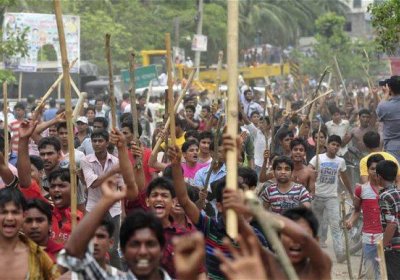Two years after the 2013 factory collapse in the Bangladeshi capital, Dhaka, that killed more than 1100 people, the victims' families filed a lawsuit in a US federal court on April 24. It targets Wal-Mart Stores Inc and other US-based companies that sourced their products from the Rana factory.
The plaintiffs claim the retailers knew “that Bangladesh factories had an extremely poor record of workplace safety standards and industrial building standards, including garment factories”.
Bangladesh
Greece, Venezuela discuss cooperation
Venezuelan President Nicolas Maduro has invited the newly-elected Greek prime minister to Caracas, TeleSUR English said on February 9.
“I have invited Alexis Tsipras, comrade Alexis, to visit us as soon as he can, here in Venezuela,” Maduro told Venezuelan public TV.
“He plans to come to Latin America. He mentioned all the pressures that he is under. Because of a savage, savage neoliberal system that has been applied in Greece.”
Tsipras expressed an interest in touring Latin America, starting with the Bolivarian Republic of Venezuela.
“Bangladesh is a world leader in adaptation to natural disasters,” Bangladeshi community organiser Nasima Akter told a Toronto audience January 8. “But now climate change threatens to wash away all our gains.”
Akter had been invited by East End Against Line 9, a neighbourhood committee formed to protest against a proposed cross-Toronto tar-sands pipeline. The East End committee wanted to learn about the implications of Canada’s reckless tar-sands development for a poor and vulnerable nation.
The National Tertiary Education Union released this statement on October 21.
***
Australian immigration officials have refused to grant a visa to a Bangladeshi union activist on the basis that he is too poor.
The activist's trip was to be sponsored by the National Tertiary Education Union (NTEU) as part of its contribution to Anti-Poverty Week, which draws attention to issues of poverty and social exclusion.
Bangladesh police have used batons, rubber bullets and tear gas in a bid to stop ongoing protests by garment workers demanding higher wages.
But the fifth day of protests in two industrial districts near the capital Dhaka, on September 25, forced the closure more than 100 factories for the day, police said.
Gazipur and Narayanganj house hundreds of factories that supply garment products to numerous global brands, including Wal-Mart and H&M.
After a three-day work stoppage in the wake of the protests, bosses tried to restart the factories today, but the efforts failed.
In the aftermath of the April 24 Rana Plaza collapse, the plight of Bangladeshi garment workers occupied global media attention in a way it never had before.
The inconvenient thing about Rana Plaza, as far as the fashion brands that rely on outsourced sweatshop labour were concerned, was that so many workers — more than 1100 — died in one spectacular incident.
When terrorist bombers killed three people in Boston, the FBI moved heaven and earth to apprehend them. When suppliers to Wal-mart and other big brands in Bangladesh killed more than 950 people (as of May 9) on April 24 in one of their garment factory death traps, the FBI sat on its hands.
But those responsible — Wal-mart’s board of directors — are well known and could be easily apprehended.
Thousands of workers paraded through central Dhaka on May Day to demand safety at work after the collapse of garment factory on April 24 -- the country's worst industrial disaster. The collapse killed 402 people and injured 2500.
A huge procession of workers on foot, lorry and motorcycle wound its way through central Dhaka waving banners, beating drums and chanting "direct action" and "death penalty" for the owner of the factory.
From a loudspeaker on the back of a lorry, one participant said: "My brother has died. My sister has died. Their blood will not be valueless."
The owner of the eight-storey Bangladesh factory complex that collapsed on April 24 killing at least 362 people has been arrested at the country's border with India. Three owners of garment factories in the collapsed building on the capital's outskirts have also been arrested. They are suspected of forcing staff to work, ignoring safety warnings.
Two government engineers involved in approving the building's design have also been detained.
The South Asian Social Forum will be held in Dhaka, Bangladesh, from November 18-22. Part of the World Social Forum, SASF takes the democratisation process as its core theme.
The World Social Forum, which was formed in 2001, has its roots in the early 1990s and different NGO initiatives and activities parallel to those of the United Nations.
Its formation was inspired by the mass upsurge across Latin America, in particular the struggle of the Zapitistas in southern Mexico and the 1999 Seattle protests against the World Trade Organisation.
Labour rights groups around the world are calling for the immediate release of Mehedi Hasan, a Bangladeshi field investigator for the US-based Workers Rights Consortium.
On the night of March 25, 1971 the Pakistani army began a campaign to murder and rape thousands of Bengalis in an attempt to curb the rise of the Bengali national independence movement in what was then East Pakistan Bangladesh today.
- Previous page
- Page 3
- Next page





